Prayer for the Living Read online
Page 5
‘I’ve missed you,’ he said.
‘You can’t have missed me or I would be there.’
‘Sometimes I forget how to dream,’ he said.
‘Last night you lost me and did not notice.’
He could not speak.
‘Do you know how strange it is to not be the centre of your loving attention?’
He stayed silent.
‘It makes one disappear. It makes one invisible.’
In a far corner of the waiting room a woman was practising tango steps to music in her headset. He slipped into someone’s mind and did not know how. It was a man thinking of his girlfriend. That morning he realised he could not live with her. He realised also that one morning he would commit suicide and it would never be clear why he had done it, because all the evidence showed that he should have been happy. He was still in this man’s mind when the ferry arrived. He looked around to see who it might have been. All the young men had anxious faces. It could have been any one of them.
They got on board the ferry and made their way to the top deck. He watched the ships drifting on the Bosphorus. He watched the churning of water in the ferry’s wake.
15
When he looked sideways he saw the woman in a haze of hovering birds. In a kind of benediction, she was feeding them. The wind was strong and cold. In Kadıköy they came upon the statue of a man with a plate of fishes. It was raining now and they bought transparent umbrellas. That day it seemed the woman enjoyed laughing at him. When he made a mistake, when he opened the umbrella and dropped it, she laughed.
They caught a yellow bus to Bağdat street and walked its length and sat in the drizzling park. He had lowered his umbrella, to feel the rain on his face. He was happy. She did not speak, but her face glowed.
Near the pier, they wandered through the market of spices and fruits. They came to a second-hand bookshop and spent an hour browsing downstairs and upstairs. They bought an old book about the city and another on Sufi dancing. In the Çiya restaurant opposite they sat at an upstairs window and looked at the busy street. They had Iskenderun kebab and a mixed salad and black tea.
‘Why do you speak so little?’ he said to the woman.
‘It’s better to listen.’
‘What do you listen to?’
‘The city.’
‘What do you hear?’
She fastened on him a luminous gaze.
‘I can hear a woman thinking that it is easier for her to love someone she does not know.’
‘Really?’
‘Yes.’
‘What else can you hear?’
‘I can hear a widower thinking that we meet people late in their personal story and that’s where the difficulty of love comes from. What can you hear?’
‘I can hear a student thinking that we fall in love with a woman’s face and are often disenchanted with the character behind it.’
‘Many women are thinking that too about men.’
‘Some survive the disenchantment and discover true love.’
‘True love can only come after disenchantment.’
‘Why is that?’
‘The first enchantment is a madness and a fragility. The madness of a fool and the fragility of a spring flower. The second enchantment is as slow as the growth of a great tree and deeper than the ocean. But to get to the second enchantment one must survive the desert and the fire. Then one must grow a new heart, for the first heart dies with the disenchantment.’
He stared at her as she spoke. Her eyes were faraway and shone like green diamonds.
16
They had finished eating. They had paid and were going down the narrow stairs when he heard himself say:
‘Will you marry me?’
She laughed.
‘I’m your dream. How can you marry your dream?’
17
At 6.35 p.m., just outside the restaurant, just after she mentioned the word dream, the chain round his neck broke. The seven jewels fell down his chest. One by one he fished them out from under his shirt.
It was dark over the marketplace. He knew that it was time to go back home.
18
As they were leaving Kadıköy, on the ferry, he saw two flags fluttering on the dock. They passed the silent shipyard. As they approached Eminönü he saw, high up on a street, traffic like lava pouring down the hill. Another street was like jewels tumbling from a height. He watched the slow crawl of pearls across the bridge.
In the night the steeples levitated in gold. The hills unveiled their minarets.
He felt the flight of cathedral melodies and the weight of the tunes of the mosques. The city haunted him with its history and its nocturnal splendour. The night hours flowed by and the long age bloomed in ruins and towers. The city at night was a carnival riot of red and blue and yellow lights, glimmering bulbs of diamond and gold.
19
Back in the hotel they lingered in the heft and lightness of the lobby. They went upstairs and decided to have a hammam. He was struck that the woman who looked after them was called Ebro. He slept briefly in a paradise of bubbles. Back in their room he found it hard to sleep. He kept falling into slippages. He suffered and was resurrected in the march of the centuries. Like flowers, the palaces sprouted. The cathedral drew the heart of the world like pilgrims to a centre. The two cities rose and became one, with the curve of its river and its emerald skies. He became the viaducts and the underground cistern and the dark water shivering with big dark fish. He could not sleep and that aria pervaded his sleeplessness. Then at last he embraced the aria and realised that the music had coded the city for him privately. He was drifting now when he felt the strange woman next to him and he wanted the music played over and over again the way some people would like to see, in a special light, the face of their elusive dream of love brought fresh from the living air.
20
At the point in which he was happiest, he became the city itself. He became its pavilions, its golden throne, its sycamore trees, and the shimmer of the Bosphorus in the sunlight. And when he became the city he lost everything. He fell into a long mysterious absence, and woke up in his own bed, surrounded by stacks of books about a city he had never visited.
21
Two weeks later he was sitting by the misting window of the café. He had been back there every day and the strange man had not returned. In the newspapers he had learned that during his absence three young girls had fled to Istanbul on their way to join a violent Islamic cult in Syria. There had been a diplomatic row.
He had been sitting by the window, thinking that the man would never return, when the lights changed. He turned and saw the strange man next to him, dressed in white and wearing white gloves.
‘What did you do to me?’ he said to the man. ‘Was that a dream or was it real?’
‘I can buy you a ticket to Istanbul and when you come back you can tell me which is more real.’
‘But what did you do to me?’
‘I showed you that it is unreality that makes the world real.’
‘I don’t understand.’
‘You take every day for granted. That for you is real. But if you stop taking it for granted it becomes unreal. Unreality makes the world real. If you remember how unreal the world is you will be fine.’
22
One day, three months later, he was wandering the streets of a northern city. He had never felt clearer in his head.
As he was walking he heard the slender strains of the aria from the Goldberg Variations. It was seeping out of a fine building. Without a moment’s thought he went and knocked on the door. No one answered. He pushed the door open into a clear space with polished floors. He saw couples practising salsa. Further on he saw a ballet class in progress. There was a woman at the piano. When she looked up, he saw that it was her.
What do you do when your dream has stepped out of your dream?
The Canopy
A stoku
I had gone looking for them in the hotel w
here they were staying. I had just arrived. They were in their room. I wanted somewhere to sleep. I thought of big beds with clean white sheets. In the hotel lobby tables were being laid out.
I took off my trousers and coat and hid them overhead on a tarpaulin canopy. Then I met a senior waiter who was carefully moving tables to their new positions. I asked him about it. He was keen to explain. He said there is a perfect geometry of tables which creates optimum pleasure for guests. Too close to one another and they irritate. Too far from one another and diners feel isolated. It’s a kind of magic. He showed me. He placed one table at a distance from another, and asked me to observe the mood. It was quite fascinating. He had a point.
While he was speaking I noticed he was wearing something odd on his chest. It was the smooth furry face of a wolf. It projected outward from his chest.
‘What’s that?’ I said.
‘What do you think?’
‘It’s a wolf.’
‘No it’s not!’ came a voice from behind me.
I turned and saw a boy with his mother. She had a big face.
‘No it’s not,’ said the boy again. ‘It’s more like a girl.’
I looked back at the waiter. I was surprised to see that he now had the brightly coloured face of a girl round his neck. The wolf on his chest had gone. What had happened to it? Then I wondered what he meant by having round his neck the face of a girl done in brightly coloured dots. It occurred to me that perhaps he was sexually ambiguous. I’m not sure why. It was a silly thought. After all he was the master of the magic spacing of tables.
He turned back to his work. I went back the way I had come, and retrieved my trousers and jacket from their hiding place on the canopy. In the corridor beyond I put on my trousers. The waiter was watching me getting dressed in the corridor.
When I was putting on the jacket he asked what I thought I was doing.
‘What do you mean?’ I said.
‘What are you playing at?’
I looked puzzled.
‘I saw that,’ he said, pointing at the canopy.
I tried to explain it all to him, but the other waiters had gathered. For a moment I thought he was going to throw me out of the hotel and ban me from ever being a guest. But somehow I got out an explanation. I had some friends staying there. I was hoping to find them. I needed to sleep, but I was fine now. They heard me out. I must have talked for a long time. I must have told them a very long story indeed. I got lost in my story and wandered down the many corridors of my own feverish invention.
When I finished, time had altered. I had talked myself into a blue space. There was no one around. The corridor was empty. I went out to the lobby and waited for my friends to emerge from the world of sleep.
In the Ghetto
We were returning from a visit to a relation and had just turned off the Badagry Road into the dusty street that led home, when our old white Peugeot spluttered and fell silent.
We piled out. The doors were hot and the side windows reflected the glare.
The smell of heated oil came from below.
The road burned through our shoes. The sun was fierce overhead. Kiosks and stalls quivered in the light. A black dog lay beside a water-tank. Women selling cooked beans and fried plantain sat on both sides of the road. The blare of highlife music pouring out from the record shops increased the force of the heat.
Dad lifted the hood of the car and peered into the engine. We stood around, trying to avoid the eyes of old men sitting in the shade of beer shops, young men loafing, girls who paused in their chores. Their eyes looked at you as if you were a fool. We felt foolish standing around the broken-down car in the middle of the ghetto.
I went to see what Dad was doing. He looked up at me briefly, his glasses catching sharp rays of light. Sweat dripped down his forehead. He had taken his coat off and his armpits had circles of wetness.
He checked the oil, tweaked the plugs, and tried the ignition. The car wouldn’t start.
‘We’ll have to push,’ he said.
The heat from the car stunned us. Apart from Dad, there was just three of us. We were kids and we felt defeated. A dog ran past, and barked at us. We were the ghetto entertainment.
The three of us pushed the car, but it would not move. We gave it another try, and still it would not move. On the street, bits of broken glass shone like points of fire.
People went past and glanced at the stalled car. Men in khaki trousers and dirty white shirts, men in shokoto and multicoloured shirts, men who were barefoot in shorts went past and none of them stopped to help. A family of women, a mother and her several daughters, paused to talk about the car. We were sweating as we watched them. They did not sweat. Their faces were like smooth petals of hibiscus flowers in the sun.
When they went, Dad said:
‘Boys, you have to push this car or we’ll never get home.’
Home was not that far away. It was less than two hundred yards. Dad could not afford to leave the car because it would be picked clean by the time he came back for it. There were no mechanics around. We had to push the car home or lose it.
We pushed again, but it did not move an inch.
‘Ask people to help you,’ Dad said.
We asked passers-by. We asked the big men, the young boys, the men loafing in the shade of drinking parlours, but no one would help us.
Uri, the middle boy of us three, said:
‘People just don’t care.’
He was the one interested in engineering. He looked at the people who went past with a sour expression.
‘Let’s not care about them. Let’s push,’ Essay, the youngest, said.
He was defiant, and tried pushing on his own. The car didn’t budge. He gave up. We watched the ghetto silently watching us. A white cat gazed at us from the top of a rusted, abandoned car. A woman selling soft drinks eyed us from the roadside. She gestured to me to come and buy her Fanta. I shook my head. Dad lit a cigarette in the driver’s seat and began smoking. We watched the smoke plume out from the side window.
‘No one is going to help us,’ Uri said.
‘They might.’
‘Why don’t we ask those girls?’ Essay said.
‘You ask them and see what they say.’
Uri’s voice was thick with irony.
‘Are we just going to stand here?’
‘What else do you suggest?’
‘It’s very hot.’
‘Get in the car then.’
‘My feet are burning.’
‘Stop whining.’
‘I’m not whining.’
‘Shut up, you two,’ I said.
‘I’m thirsty.’
‘He’s thirsty.’
A group of girls came towards us. They were pretty and all dressed up in party clothes. The girls scrutinised us as they drew up to the car. Uri pretended to be looking into the boot. Essay stared at them and said:
‘Will you help us push the car?’
The girls stopped and walked round the car and saw Dad finishing his cigarette. They talked among themselves. Then they took off their high heel shoes and all six of them began pushing the car lightly while laughing. We joined them in the pushing but their laughter robbed us of effort. The car didn’t move and they gave up and dusted the soles of their feet and put their shoes back on, laughing and teasing us about how handsome we all were. Then they wandered off into the heat-shimmer of the dusty road.
When they had gone, Dad said:
‘Who were those girls?’
‘Nice people,’ Essay said, ‘who tried to help.’
‘They were making fun of us,’ Uri said.
Our shadows were sharp and dark on the rough dirt road. Dad got out of the car and fiddled about with the carburettor some more. His hands came out dirty and he wiped them clean with a rag he had in the boot. The ghetto had not stopped looking at us. A group of urchins gathered under the eaves of a shop, watching us. In the same shop an old man smoked a cigarette and drank a bottle of be
er. He studied us with rheumy eyes. The charcoal seller had piled out his charcoal in bags and sat with his wife under a tattered umbrella. They stole glances at us.
Even a curled-up dog kept an eye on us.
‘What are we going to do, Dad?’ Uri said.
‘What else can we do? We’ll push.’
‘But it’s only the three of us,’ Essay said.
‘I will help you,’ Dad said. ‘I will push from the driver’s door. If it kickstarts, I’ll jump in.’
Dad opened the driver’s door and he pushed with the door open. We all heaved at the car from behind. For the first time it moved. It moved a few inches and we heaved harder and the car started a little up the road. When it had gained some momentum Dad jumped into the car and worked the throttle and gears. The engine whined, cranked, groaned, then died out.
‘That was good,’ Dad said.
He rolled up his sleeves. We pushed again, Dad with the door open, and us at the back. We got the car rolling past the charcoal sellers and Dad jumped in, the exhaust spluttered, the engine picked, and then petered out.
‘We’re nearly there. Keep going, children!’ Dad said.
We were exhausted. The metal of the car gave off a burn. Fumes from the exhaust mingled in our breathing. More eyes watched us from the shade along the debris-ridden road. A motorcycle roared past. On its pinion was a slim girl in a short skirt, without a helmet. She looked back at us and smiled.

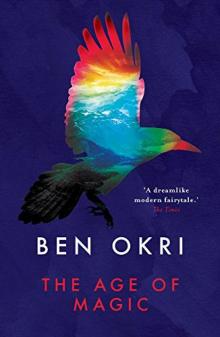 The Age of Magic
The Age of Magic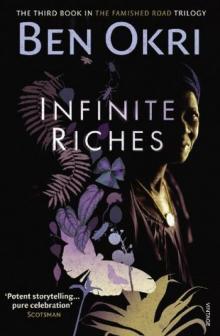 Infinite Riches
Infinite Riches Songs of Enchantment
Songs of Enchantment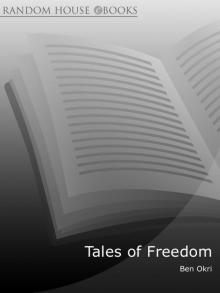 Tales of Freedom
Tales of Freedom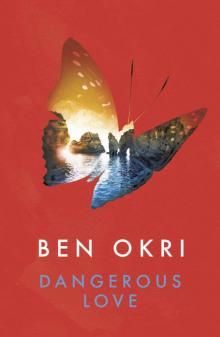 Dangerous Love
Dangerous Love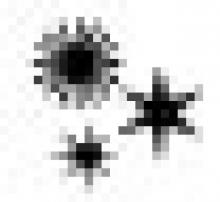 Starbook
Starbook The Famished Road
The Famished Road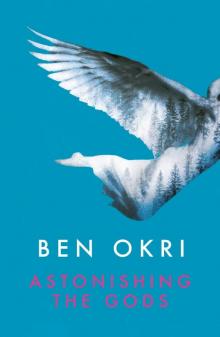 Astonishing the Gods
Astonishing the Gods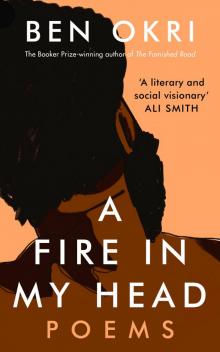 A Fire in My Head
A Fire in My Head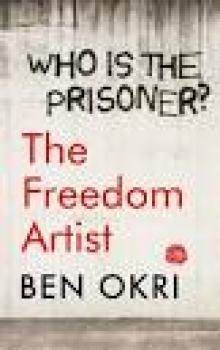 The Freedom Artist
The Freedom Artist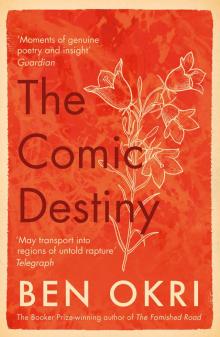 The Comic Destiny
The Comic Destiny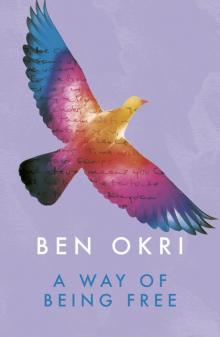 A Way of Being Free
A Way of Being Free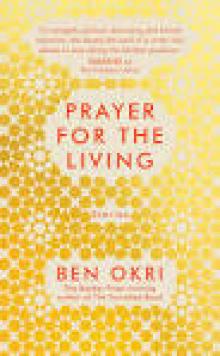 Prayer for the Living
Prayer for the Living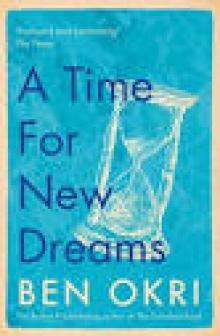 A Time for New Dreams
A Time for New Dreams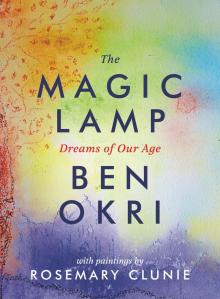 The Magic Lamp
The Magic Lamp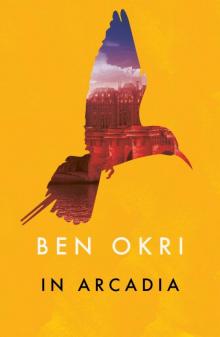 In Arcadia
In Arcadia